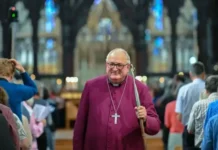The first partnered lesbian Anglican bishop in Britain has told BBC-Wales that she will not be an aggressive campaigner for same-sex marriage in the Church in Wales, but hopes her election will be greeted with joy by the LGBT community.
The Rt. Rev. Cherry Vann was consecrated Bishop of Monmouth on 27 Jan 2020 and will be enthroned at Newport Cathedral on 1 Feb 2020. She said she wished her election to be a “a sign of hope. There are a lot of gay people in our schools, in our colleges and universities, out there in society who think that the church is against them, that they don’t have a place in the church.”
“I hope that being here as a gay person, in a same-sex relationship, will give those people hope and help them to see that this is something that the church embraces and is able to celebrate along with any other faithful committed relationship.”
“I hope that people are not disappointed… I can see that some might be hoping that I might be more of a campaigner for the cause, but I am here as a bishop with a job to do,” she said.
Originally from Leicestershire, Bishop Vann has served as Archdeacon of Rochdale, in the Diocese of Manchester, for the past 11 years. She trained for ministry at Westcott House, Cambridge, and was ordained as a deacon in 1989. Among the first women to be ordained as a priest in the Church of England in 1994, she spent her entire ministry in the Diocese of Manchester. She is also an honorary canon of Manchester Cathedral and a former chaplain to deaf people.
She was Prolocutor of the Lower House of the Convocation of York from 2013 to her election last September and was an ex-officio member of the Archbishops’ Council.
Following her election in September, Anglican Ink asked the Church in Wales press office if they had any comment about Bishop Vann being the church’s first partnered lesbian bishop. They declined to comment. Bishop Vann and her partner, Wendy, are in a domestic partnership. While the Church of England requires such arrangements to be celibate, the Church in Wales does not.




I have never met this lady, but from all that I have heard about her from someone who knows her well, I am sure that she will make an excellent bishop of Monmouth.